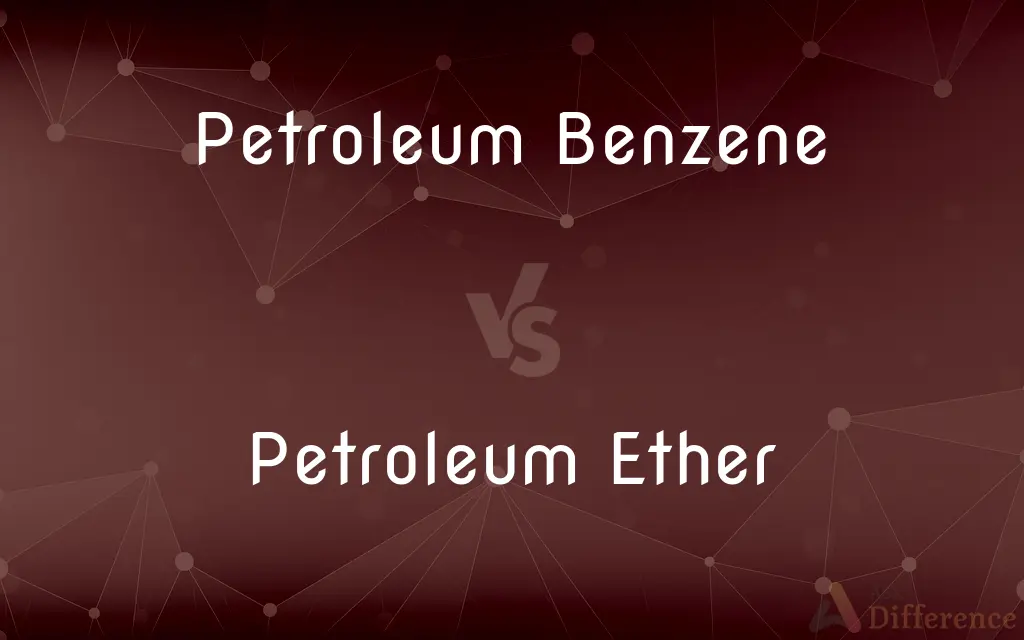Petroleum Benzene vs. Petroleum Ether — What's the Difference?
By Tayyaba Rehman — Published on November 19, 2023
Petroleum Benzene is a refined form of benzene, whereas Petroleum Ether is a volatile, low-boiling fraction from petroleum refining.

Difference Between Petroleum Benzene and Petroleum Ether
Table of Contents
ADVERTISEMENT
Key Differences
Petroleum Benzene refers to a specific hydrocarbon solvent which is essentially a refined form of benzene. This substance is often utilized in the laboratory as a nonpolar solvent. On the other hand, Petroleum Ether isn't a single compound like Petroleum Benzene. Instead, it's a mixture of various hydrocarbons.
Petroleum Benzene is best known for its aromaticity, being a part of the aromatic hydrocarbons class. Its purity allows for more specific applications, especially in the field of organic chemistry. Petroleum Ether, being a mix of aliphatic hydrocarbons, lacks this aromatic quality, and it often consists of pentane and hexane, among others.
The name "Petroleum Benzene" can sometimes mislead individuals into believing it's derived directly from petroleum. However, it's important to note that while benzene can be found in petroleum, Petroleum Benzene is a purified form. Petroleum Ether, in contrast, is directly sourced from the petroleum distillation process.
In terms of safety, both Petroleum Benzene and Petroleum Ether are flammable and should be handled with care. However, due to its aromatic nature, Petroleum Benzene is also a recognized carcinogen, necessitating even more caution during handling. Petroleum Ether, while still hazardous, doesn't possess the same carcinogenicity as its counterpart.
Finally, in various applications, especially in labs, Petroleum Benzene is often chosen for tasks that require a nonpolar solvent without impurities. Petroleum Ether, being less refined and a mixture, is frequently used for tasks that don't demand as strict purity, such as extraction processes.
ADVERTISEMENT
Comparison Chart
Composition
A refined form of benzene.
Mixture of various hydrocarbons.
Nature
Aromatic hydrocarbon.
Aliphatic hydrocarbons (like pentane and hexane).
Origin
Can be found in petroleum but is refined further.
Directly sourced from petroleum distillation.
Safety Concern
Recognized carcinogen.
Flammable but not specifically carcinogenic.
Common Application
Used in organic chemistry as a nonpolar solvent.
Often used for extractions in labs.
Compare with Definitions
Petroleum Benzene
A nonpolar solvent in the aromatic hydrocarbon class.
Petroleum Benzene is an essential solvent for many synthetic routes.
Petroleum Ether
A low-boiling fraction from petroleum refining.
When evaporating, Petroleum Ether tends to leave no residue.
Petroleum Benzene
A refined aromatic hydrocarbon solvent.
The laboratory primarily used Petroleum Benzene for organic reactions.
Petroleum Ether
A common solvent used for extractions in laboratories.
Ensure the vial is sealed tightly when storing Petroleum Ether.
Petroleum Benzene
A clear, colorless liquid with characteristic odor.
She noted the distinctive smell of Petroleum Benzene when entering the lab.
Petroleum Ether
A volatile solvent derived from petroleum distillation.
Petroleum Ether is highly flammable, so keep it away from open flames.
Petroleum Benzene
A purified form of benzene utilized in labs.
Ensure you wear gloves when handling Petroleum Benzene.
Petroleum Ether
Comprises mainly pentane and hexane fractions.
Due to its constituents, Petroleum Ether is ideal for certain extraction processes.
Petroleum Benzene
A recognized carcinogenic compound.
Due to its carcinogenic nature, exposure to Petroleum Benzene should be minimized.
Petroleum Ether
A mixture of aliphatic hydrocarbons.
The extraction was successfully carried out using Petroleum Ether.
Common Curiosities
Is Petroleum Benzene a carcinogen?
Yes, Petroleum Benzene is recognized as a carcinogen.
What is Petroleum Ether?
Petroleum Ether is a volatile mixture of aliphatic hydrocarbons derived from petroleum distillation.
Which is more hazardous: Petroleum Benzene or Petroleum Ether?
Both are flammable, but Petroleum Benzene has added carcinogenic risks.
Are both Petroleum Benzene and Petroleum Ether the same?
No, Petroleum Benzene is a specific compound while Petroleum Ether is a mixture of hydrocarbons.
What are the main components of Petroleum Ether?
Petroleum Ether mainly consists of aliphatic hydrocarbons like pentane and hexane.
Are these solvents used in industries outside the laboratory?
Yes, both Petroleum Benzene and Petroleum Ether have various industrial applications, from cleaning to synthesis.
What is Petroleum Benzene?
Petroleum Benzene is a refined aromatic hydrocarbon solvent derived from benzene.
What's the primary use of Petroleum Ether?
Petroleum Ether is commonly used for extractions in laboratories.
Is Petroleum Benzene directly obtained from petroleum?
While benzene is found in petroleum, Petroleum Benzene is a further refined form.
Can I use Petroleum Ether and Petroleum Benzene interchangeably in the lab?
Not always, as their chemical properties differ. The specific application will dictate the choice.
Is Petroleum Benzene aromatic?
Yes, Petroleum Benzene is an aromatic hydrocarbon.
Does Petroleum Ether have any aromatic compounds?
No, Petroleum Ether is primarily composed of aliphatic hydrocarbons.
How should I store Petroleum Benzene and Petroleum Ether?
Both should be stored in cool, dry places away from open flames or heat sources.
Is Petroleum Benzene the same as regular benzene?
No, Petroleum Benzene is a more refined form of benzene.
Are there safety concerns regarding inhalation of vapors from these solvents?
Yes, inhalation of vapors from both Petroleum Benzene and Petroleum Ether can be harmful and should be avoided.
Share Your Discovery

Previous Comparison
Flash Drive vs. Pen Drive
Next Comparison
Parliament vs. Legislative AssemblyAuthor Spotlight
Written by
Tayyaba RehmanTayyaba Rehman is a distinguished writer, currently serving as a primary contributor to askdifference.com. As a researcher in semantics and etymology, Tayyaba's passion for the complexity of languages and their distinctions has found a perfect home on the platform. Tayyaba delves into the intricacies of language, distinguishing between commonly confused words and phrases, thereby providing clarity for readers worldwide.












































